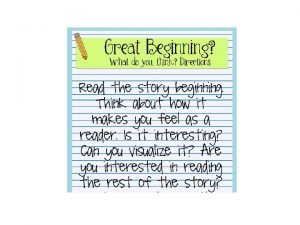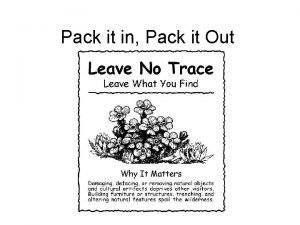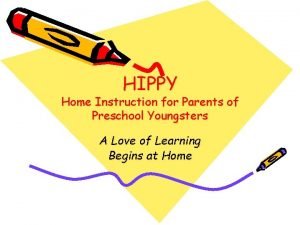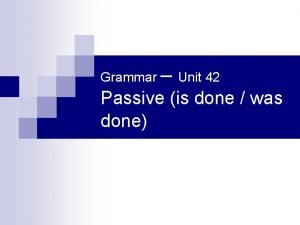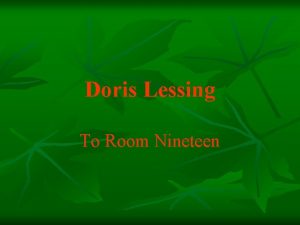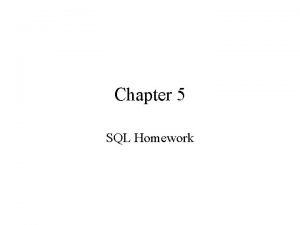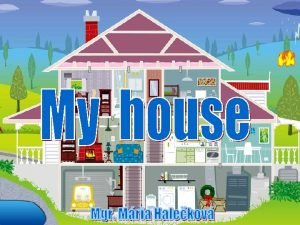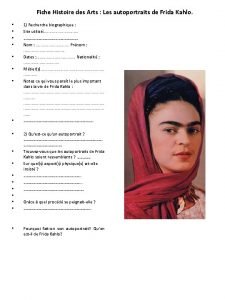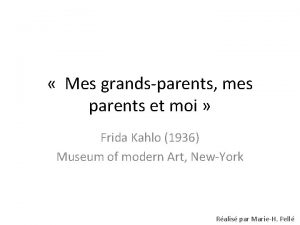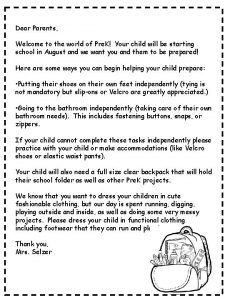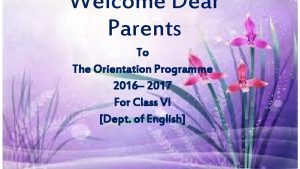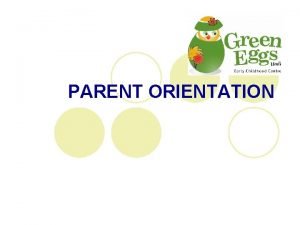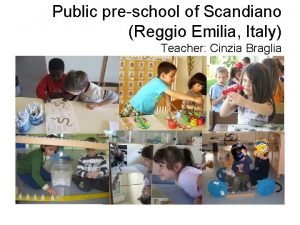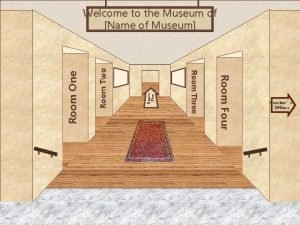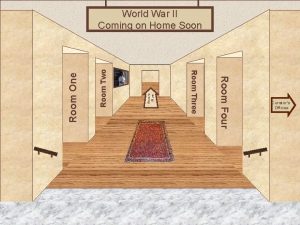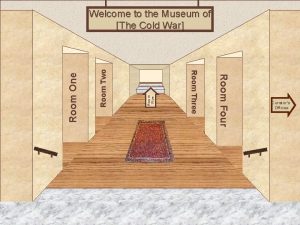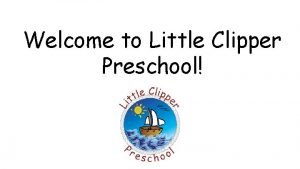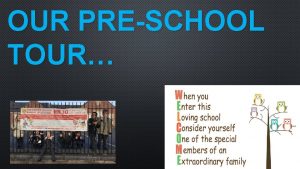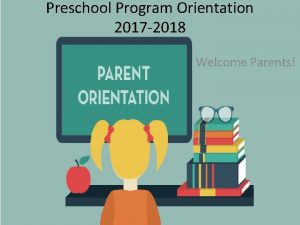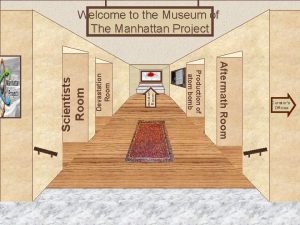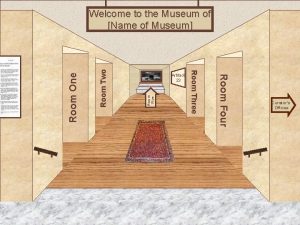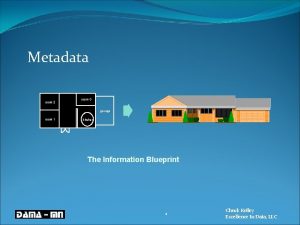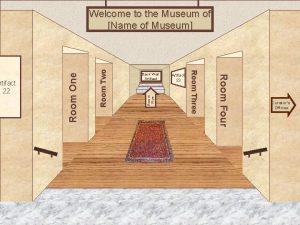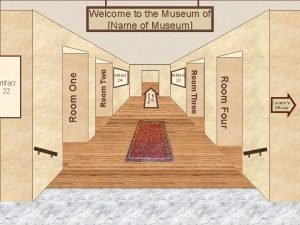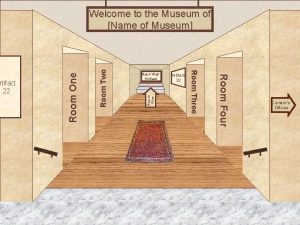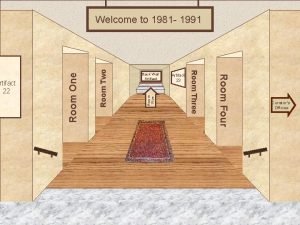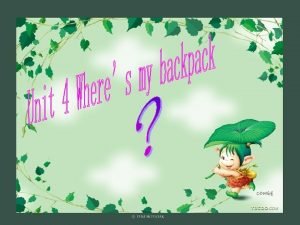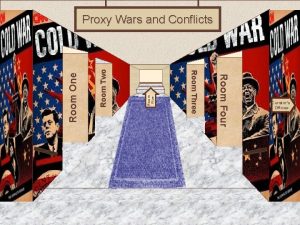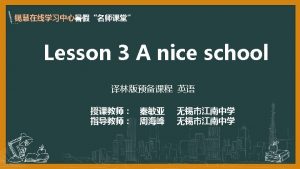TARPORLEY DONE ROOM PRESCHOOL PARENTS WELCOME PACK Parents


















- Slides: 18

TARPORLEY DONE ROOM PRE-SCHOOL PARENTS WELCOME PACK

Parents Welcome Pack Introduction Our Vision Our vision is to offer a safe secure and stimulating environment where children and their families feel happy and respected. Where children are treated as individuals enabling them to learn and flourish through play by exploring and investigating at their own level and pace. Our Pre-school Aims: • • Provide high quality care and education for children below statutory school age. Work in partnership with parents to help children to learn and develop Add to the life and well-being of the local community. Offer children and their parents a service that promotes equality and values diversity. Parents are regarded as members of our pre-school who have full participatory rights. These include a right to be: • • Valued & respected at all times Kept informed Consulted Involved and included at all levels. As a community based, voluntary managed setting, we also depend on the good will of parents/carers and their Involvement to keep going. Membership of the pre-school carries expectations on parents for their support and commitment.

We aim to ensure that each child: – – – – Is in a safe and stimulating environment Is given generous care and attention, because of our ratio of qualified staff to children, as well as volunteer parent helpers. Has the chance to join with other children and adults to live, play, work and learn together. Is helped to take forward her/his learning and development by being helped to build on what she/he already knows and can do. Has a personal key person who makes sure each child makes satisfying progress. Is in a pre-school that sees parents as partners in helping each child to learn and develop. Is in a pre-school in which parents help to shape the service it offers. Children’s Development & Learning The provision for children’s development and learning is guided by The Early Years Foundation Stage (DCFS 2012). Our Pre-school reflects the four guiding principles of the Early Years Foundation Stage.

A Unique Child Development: Inclusive Practice: Keeping Safe: Health & Well-Being: Skilful communicator, competent learner Equality and diversity, children’s entitlements, early support. Being safe and protected, discovering boundaries, making choices Growth and developing, physical and emotional wellbeing. Positive Relationships Respecting Each Other: Parents as Partners: Supporting Learning: Key Person: Understanding feelings, friendship, professional relationships Respecting diversity, communication, learning together. Positive interactions, listening to children, effective teaching. Secure attachment, shared care, independence. Enabling Environments Observations, Assessments and Planning: Supporting Every Child: The Learning Development: The Wider Context: Staring with the child, planning assessment. Children’s need, the learning journey, working together The emotional environment, the outdoor environment, the indoor environment. Transitions and continuity, multi-agency working, the community. Children Develop & learn in different ways and at different rates Play & Exploration: Active Learning: Creativity & Physical: Learning through experience, adult involvement, contexts for learning. Mental and Physical involvement, decision making, personalised learning. Making connections, transforming and understanding, sustained shared thinking. The framework covers the education and care of all children in Early Years provision, including children with special educational needs and disabilities.

The areas of Learning & Development - How we provide for Development & Learning Children start to learn about the world around them from the moment they are born. The care and education offered by our pre-school helps children to do this by providing all of the children with interesting activities that are appropriate for their age and stage of development The Areas of Development & Learning comprise: Prime Areas Specific Areas Communication & Language Physical Development Personal, Social and Emotional Development Literacy Mathematics Understanding the World Expressive Arts & Design The practice guidance sets out in ‘Development Matters’ the likely stages of progress a child makes along their learning journey towards the early learning goals. For each area, the practice guidance sets out the Early Learning Goals (These goals state what it is expected that children will know and be able to do by the end of the reception year of their education). Our pre-school has regard to these matters when we assess children and plan for their learning. Understanding the world Our programme supports children to develop: • • Knowledge about the natural world and how it works Knowledge about the made world and how it works. Their learning about how to choose and use, the right tool for a task. Their learning about computers, how to use them and what they can help us to do. Their skills on how to put together ideas about past present and the links between them. Their learning about their locality and it special features Their learning about their own and other cultures.

Personal & Social Development Our programme supports children to develop: Positive approach to learning and finding out about the world around them. Confidence in themselves and their ability to do things, and valuing their own achievements. Their ability to get on, work and make friendships with other peoples, both children and adults. Their awareness of, and being able to keep to , the rules which we all need to help us to look after ourselves, and other people and our environment. • Their ability to expect to have their ways of doing things respected and to respect other people’s ways of doing things. • • Communication & Language Our programme supports children to develop: • • Conversational skills with one other person, in small groups and in large groups to talk with and listen to others. Their vocabulary by learning and meaning of – and being able to use – new words. Their ability to use words to describe their experiences. Their knowledge of the sounds and letters that make up the words we use. Their ability to listen to and talk about stories. Knowledge of how to handle books and that they can be a source of stories and information. Knowledge of the purposes for which we use writing. Making their own attempts at writing. Expressive Art & Design Our programme supports children to develop: • The use of paint, materials, music, dance, words, stories and role-play to express their ideas and feelings. • Their interest in the way that paint, materials, music, dance, words, stories and role-play can be used to express ideas and feelings.

Physical Development Our programme supports children to develop: • Increasing control over the large movements that the can make with their arms, legs and bodies, so that they can run, jump, hop, skip, roll, climb balance and lift. • Increasing control over the small movements they can make with their arms, wrists and hands, so that they can pick up and use objects, tools and materials. • Their understanding about the importance of and how to look after, their bodies. • Their ability to dress and undress themselves, and look after their personal hygiene needs. Mathematics Our programme supports children to develop: • Understanding and ideas about how many, how much, how far and how big. • Understanding and ideas about patterns, the shape of objects and parts of objects, and the amount of space taken up by objects. • Understanding that numbers help us to answer questions about how many, how much, how far and how big. • Understanding and ideas about how to use counting to find out how many, • Early ideas about the result of adding more and taking away from the amount we already have. Literacy • • • Their knowledge of the sounds and letters that make up the words we use. Their ability to listen to and talk about stories. Knowledge of how to handle books and that they can be a source of stories and information. Knowledge of the purposes for which we use writing. Making their own attempts at writing.

Our approach to learning & development & assessment Learning through Play helps young children to learn and develop through doing and talking, which research has show to be the means by which young children learn. Our pre-school uses the practice guidance Early Years Foundation Stage to plan and provide a range of play activities which help children to make progress in each of the areas of learning and development. In some of these activities children decide how they will use the activity and, in others, an adult takes the lead in helping the children to take part in the activity. In all activities information from the practice guidance to the Early Years Foundation Stage has been used to decide what equipment to provide and how to provide it. Working together for your children In our pre-school we maintain the ratio of adults to children in the pre-school that is set through the EYFS Requirements. We also have volunteer parent helpers where possible to complement these ratios. This helps us to: • • Give time and attention to each child Talk with the children about their interests and activities. Help children to experience and benefit from the activities we provide Allow the children to explore and be adventurous in safety.

Information about all the staff employed at the Done Room is available in the parents information booklet which is located in the main entrance hall together with pictures displayed of all the staff working here at the Pre-School. How Parents take part in the Pre-School Our Pre-School recognises parents as the first and most important educators of their children. All of the staff sees themselves as partners with the parents in providing care and education for their child. There are many ways in which parents take part in making the pre-school a welcoming and stimulating place for children and parents, such as: – – – – Exchanging knowledge about their children’s needs, activities, interests and progress with the staff. Helping at sessions of the pre-school Sharing their own special interests with the children. Helping to provide, make and look after the equipment and materials used in the children’ play activities. Being part of the management of the Pre-School. Taking part in events and informal discussions about the activities and curriculum provided by the pre-school. Joining in community activities in which the pre-school takes part. (i. e. carnival) Building friendships with other parents in the pre-school. The Parents Rota The pre-school has a rota which parents can sign if they would like to help at a particular session or sessions of the pre-school. Helping at the sessions enables parents to see what the day-to-day life of the pre-school is like and to join in helping the children to get the best out of their activities. Please note that we are now required to ask all parents/Carers to complete a DBS form which can be obtained from Cindy Roberts Pre-School Manager. This is a requirement of the Pre-School in line with our Safeguarding Policy and should you have any queries or questions regarding this requirement please see Cindy (Pre-School Manager).

Joining In Joining the rota is not the only means of taking part in the life of the pre-school. Parents can offer to take part in a session by sharing their own interests and skills with the children. Parents have visited the pre-school to talk about being a dentist, being a farmer, being a hairdresser and many more. We welcome parents to drop into the pre-school to see it at work or to speak with the staff. Please note that all parents who wish to join the rota will need to be DBS checked. Key Carer and your child Our pre-school uses a key carer approach. This means that each member of staff has a group of children for whom they are responsible. Your child’s key carer will be the person who works with you to make sure that we provide is right for your child’s particular needs and interests. When your child first starts at the pre-school she/he will help your child to settle and throughout your child’s time at pre-school, she will help your child to benefit from the pre-school activities. Learning opportunities for adults As well as gaining qualifications in early years care and education, the pre-school staff takes part in further training to help them to keep up-to-date with thinking about early years care and education. The pre-school also keeps itself up-to-date with best practice in early years care and education and is a member of the Pre-School Learning Alliance. From time to time the pre-school holds learning events for parents. These usually look at how adults can help children to learn and develop in their early years. Courses on similar topics are held locally by the Children’s Centre Team 01244 976158 watch out for information about these.

Policies & Procedures The way we run the pre-school is governed by our Policies & Procedures. The Pre-School Committee reviews these annually with regard to OFSTED recommendations and with help from the Pre-School Learning Alliance (PLA). Preschool is a member of the PLA, which is a support network that provides all registered pre-schools with help and advice for all areas of work – from planning children’s activities to writing business plans. All policies and procedures are written and reviews annually with input from staff and parents. Pre-school’s Policies & Procedures are very important because they make clear for committee members, staff, volunteers and parents, the principles which pre-school works towards achieving. Our Policies and Procedures aim to reflect The Welfare requirements with the Statutory Framework of the Early Years Foundation Stage whilst serving as a constant reminder of the standards our pre-school is working to achieve. Safeguarding Children Our pre-school has a duty under the law to help safeguard children against suspected or actual ‘significant harm’. Our Employment practices ensure children against the likelihood of abuse in our pre-school and we have a procedure for managing complaints or allegations against a member of staff. Our way of working with children and their parents ensures we are aware of any problems that may emerge and can offer support, including referral to appropriate agencies when necessary, to help families in difficulty. Special Needs As part of the pre-school’s policy to make sure that its provision meets the needs of each individual child, we take account of any special needs to a child may have. The pre-school works to the requirements of The Special Educational Needs Code of Practice (sept 2014). Our Special Educational Needs Co-ordinator is Cindy Roberts.

Fees The Early Years Foundation Entitlement Grant Scheme is the name for the Government scheme that provides funding for pre-school children. Children are entitled to funding for up to a total of 5 sessions (15 hrs) lunch club is included in your 15 hr entitlement. Your child will become eligible for EYFS entitlement the first term after their third birthday. You can split your entitlement between different childcare providers (e. g. Pre-school and Nursery) but you cannot claim for more than 15 hours in total. Once your child is eligible for funding you will be asked at the beginning of each term how many sessions per week you would like to claim for your child. Any extra sessions you choose for your child over the grant funded ones will be charged at £ 15. 00 per session for 2 yr olds and £ 13. 00 per session for 3 yr olds. These fees are paid half termly in advance. Please note that the Government and Local Authority are constantly reviewing the scheme and that changes may occur at any time. Before grant funding applies, fees are paid half termly in advance at £ 13. 00 or £ 15 per session. Fees continue to be payable if child is absent without notice or for a short time. Each child’s attendance at the group is conditional upon continued payment of any necessary fees and/or qualification for funding through the government Early Years Education Funding Scheme. Please use the following link to check your eligibility for the 30 hrs funding entitlement. https: //www. childcarechoices. gov. uk/ Once you have completed the application you will receive a code that Pre-School will require to validate your entitlement. Parents that both work and meet the criteria for the extended entitlement 30 hrs will need to provide a code to enable Pre-School to check their entitlement. If parents attend 2 settings and split their funding they will need to indicate which setting is to receive the universal 15 hours. Tarporley Done Room Pre-School will accommodate 15 30 hr places a day aswell as 8 2 year old places. This can be adjusted at the managers discretion in line with the best interest of the Pre-School. The Early Years Entitlement covers the delivery of the Early Years Foundation Stage only and Tarporley Done Room Pre-School ask parents to make contributions to cover additional charges such as snack, art and craft supplies, toiletries, rent increase, staff cover and stationery etc. This additional charge is requested from all funded children and is set at 50 p per funded hour attended. There is an option for parents to provide the additional resources, if you would like to do this please discuss further with the Pre-School manager. If at any time you experience difficulties in paying a bill, please talk either to the Chair Person our Pre-School Manager (Cindy Roberts). In certain situations we are happy to receive weekly instalments and of course, such matters will be dealt with in confidence. Pre-school request 4 weeks notice if your child is leaving pre-school for any reason (except when leaving at the end of the summer term to attend Primary School). Complaints Procedure If you feel uneasy about any aspect of the pre-school’s provision, please speak to our Pre-School Manager Cindy Roberts and talk over any worries or anxieties you may have. It is always better if a problem can be resolved informally. However, if you feel the matter is still not resolved then please refer to the complaints procedure, which is included in the Policies folder located in the main entrance hall.

Diary System Procedure Each child is provided with a ‘Home Contact Diary’ through the Eylog online journal system and parents/carers can contribute to this. This will be completed by your child’s Key Carer to inform parents/carers of what your child has been involved in each day or week. We will also welcome any contributions to this from home. Your Child’s Learning Journey Your child’s Learning Journey is a celebration of his/her experience. Over time it will tell a story about your child. It is a record of his/her learning, friends, activities he or she enjoys sharing with others. Staff watch, and notice, each child at play because it helps us to understand support their individual well-being and development. At The Done Room Pre-School we really get to know the children as unique people with special skills, interests and ideas. The more we understand about your special child, the better we can support them in the way that is right for them. Your child’s key carer will work together with you. Please feel welcome to join us in watching out for and noting new things. So much happens so quickly! When you tell us about your child a clearer picture unfolds and together we can plan more effectively to promote their learning. In Pre-School the Learning Journeys are completed electronically through the Eylog system and are always available and we regularly look through them with your child to remind us of happy times providing a starting point for talk about shared memories. When children are ready, they can also choose to put things that are important to them in their Scrap book. You are always welcome to look through their Learning Journey when you come into the setting.

The Learning Journey will include: • Information we have from you when your child starts and a learning plan created from this information. • Photographs – these capture moments and sequences of your child’s activities, their interests and explorations. You can add your own from home. Sometimes we will write down exactly what your child says about the photographs, so we know your child’s point of view. This is also an accurate record of language development. • Observations – These can be quick notes of significant moments we notice in your child’s learning or longer detailed observations on learning your child has initiated themselves, and adults can go on and think about the learning and how to respond specifically to your child’s way of thinking and doing things. • Tracking – This shows your child’s learning progression and will be used until the end of Reception Year at Primary School. When your child leaves our setting their Learning Journey will go with them and be completed by the new setting they attend up until they enter year one of Primary School.

Lunch Club Procedures • Children who are staying for lunch club to come into Main room at 11. 30 am (approx). • Other members of staff to clean tables using anti bacterial cleaning fluid. Bring in lunch bags, together with bin and compost bin and spare teaspoons. • Children wash hands. • Children return to the Main room where they open their lunch box and begin eating. • Staff to assist any children who may need help opening their sandwiches, lids off Tupperware, straws into drinks etc, ensuring CHILDREN MAINTAIN INDEPENDENCE WHERE POSSIBLE. Parents to provide cool packs in children’s lunch boxes at all times. • Staff should oversee how much each child has eaten. We promote healthy eating, children make healthy choices what to eat first i. e. sandwiches/wraps/pasta followed by fruit and yogurts. We ask that no chocolate or crisps to be brought in lunch boxes. Can we also remind parents that as we are a nut free setting please do not back ceral bars or peanut butter. • Aim to have finished eating by 12. 10 pm (12. 15 at latest). • Children are encouraged to play outside after lunch. • If a child has eaten nothing or very little the staff member working on lunch club will complete a lunch club preference slip explaining if they disliked or weren’t hungry. We ask parents that provide grapes/blueberries and tomatoes that they are cut up into quarters. The reason for this requirement is that these foods are a high choking hazard.

Illness Procedure Pre-school is committed to the health and safety of all the children and staff who play, learn and work here. As such, it will sometimes be necessary to require a poorly child to be collected early from a session or kept at home while they get better. Children who fall ill during a session will be comforted, kept safe and under close supervision until they are collected. Such children should remain at home until they are better for at least 24 hours, or according to the times set out on the table below. If a child falls ill outside Pre-School hours, they should notify Pre-School as soon as possible – the minimum exclusion period outlined below will then come into operation. The table lists the most common types of illness only. Please ask staff for advice should you require information regarding any illness not listed. MINIMUM EXCLUSION PERIODS FOR COMMON ILLNESS & DISEASE PERIOD OF EXCLUSION Antibiotics prescribed Chicken pox Common cold Conjunctivitis Diarrhoea/ and or vomiting Gastro-enteritis, food poisoning, Salmonella and Dysentery High temperature Impetigo Measles Pediculosis (lice) Plantar warts Rubella (German Measles) Warts (including Verrucas) First 48 hours 7 days from when rash appears as long as ‘scabs’ dried out. 1 -3 days whilst symptoms persist 24 hours or until eyes have stopped ‘weeping’ 48 hours after last occurrence 48 hours or until advised by a doctor 24 hours Until the skin has healed Days from when the rash first appears Until treatment has been given Should be treated and covered 4 days from the onset of rash Exclusion not necessary. (must be covered)

Breakfast club Daily 8. 15 am – 9. 00 am Cost of £ 4. 50 which will include a nutritious breakfast (please note that breakfast will stop being served at 8. 40 am) Early Drop off Daily 8. 40 am – 9. 00 am Cost of £ 2. 00 PLEASE NOTE THAT DUE TO SAFEGUARDING REASONS THE FRONT DOOR WILL REMAIN CLOSED UNTIL 9 AM.

We hope that your child’s time in the Pre-School will be a very happy and productive. If you have any queries or if we can be of any help, please contact the staff or any member of the committee team at any time. Tarporley Done Room Pre-School Rear of St Helen’s Church, High Street, Tarporley, CW 6 0 AG Tel: 01829 730233 Email: tarporleypre-school 2@btconnect. com Registered Charity No: 1039466
 Baripity
Baripity Pack it out pack it in
Pack it out pack it in Preschool room arrangement
Preschool room arrangement Hippy home instruction for parents of preschool youngsters
Hippy home instruction for parents of preschool youngsters Is done was done passive 1
Is done was done passive 1 Cutter mill works on the principle of
Cutter mill works on the principle of Aldanma cahilin kuru lafına
Aldanma cahilin kuru lafına To room 19
To room 19 Hotel database sql queries
Hotel database sql queries Bedroom bathroom living room kitchen
Bedroom bathroom living room kitchen Fiche histoire des arts frida kahlo
Fiche histoire des arts frida kahlo Analyse tableau frida kahlo mes grands parents
Analyse tableau frida kahlo mes grands parents Parents parents
Parents parents Welcome parents and guardians
Welcome parents and guardians Welcome dear parents
Welcome dear parents Welcome dear parents
Welcome dear parents Green eggs early childhood centre
Green eggs early childhood centre Welcome welcome this is our christmas story
Welcome welcome this is our christmas story Reggio emilia italy preschool
Reggio emilia italy preschool
